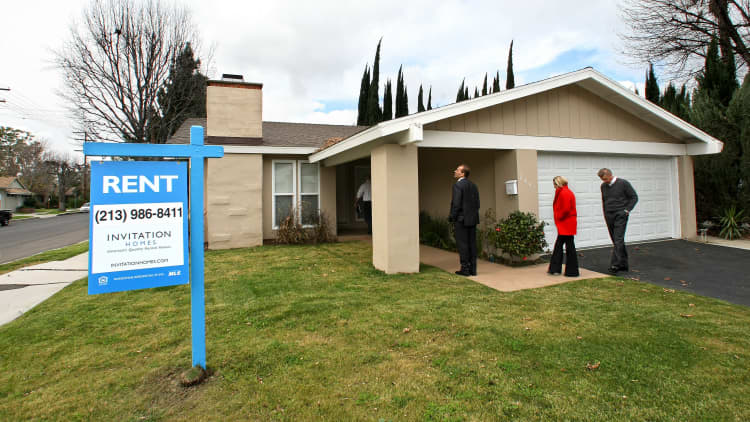
Investors are seeing green in single-family rentals, and one of the biggest players in the space is reaping rewards.
Invitation Homes, a Dallas-based single-family rental real estate investment trust and a behemoth in its class, raised $1.54 billion in an initial public offering Tuesday. It priced 77 million shares at $20 each, well within its previously stated range of $18 and $21. The stock opened slightly higher Wednesday.
"We have a great product, the industry is finally getting recognized for what it's doing, and we are driving the right margins. You see our core margins are about 62 percent right now, very competitive with multifamily. Top-line growth is competitive with multifamily and quite frankly, when you look at our fundamentals, it's a very attractive time for investors and that's why you see us come to the public market," said John Bartling, president and CEO of Invitation Homes, in an interview on CNBC's "Squawk on the Street."
The IPO, marks a triumph for Invitation's private equity owner Blackstone Group. Jonathan Gray, global head of real estate at Blackstone, told CNBC in an interview in October that housing is still a "bright spot" in the U.S. economy.
"We own about 100,000 either multifamily homes or single-family homes for rent. And across the board, across the country, we're seeing strength in that area," he said.
Blackstone made a big bet on single-family rentals, sinking roughly $10 billion into distressed homes. It recently won backing from mortgage giant Fannie Mae on up to $1 billion in debt. This will make it easier for Invitation Homes to expand its portfolio of homes in the future and could open the door for its rivals to grow more quickly as well.
"This is a new thing that we're doing, trying to learn about that scale of financing in the rental space, but the single-family rental has obviously seen a return," said Doug Duncan, chief economist at Fannie Mae.
Blackstone will keep 70 percent of its shares in Invitation Homes and board control.
"Blackstone and new shareholder interests will be closely aligned over the near term given the firm's significant ownership stake, which will likely be reduced gradually over the next three to five years," said John Pawlowski, senior research associate with Green Street Advisors.
Invitation Homes owns and manages close to 50,000 single-family rental homes in 13 metropolitan markets. It is a solid leader in the small but growing new asset class of publicly traded, single-family rental REITs. These companies, which include American Homes 4 Rent and Colony Starwood Homes, began buying distressed homes during the foreclosure crisis and over the past five years have scaled management and grown revenues.
"We've all finally proven that this is a stable portfolio," said Laurie Hawkes, a pioneer in the sector as co-founder of American Residential Properties, an Arizona-based single-family rental REIT that was acquired by American Homes 4 Rent for $1.3 billion in March 2016. "I think this is the same way it happened in multifamily."
Both American Homes 4 Rent and Colony Starwood rose Tuesday, even as the Dow fell on the day. Both also saw twice as much trading volume, clearly enthusiasm for the Invitation Homes IPO. The stocks of those two initially launched with a sputter but saw dramatic gains throughout 2016 as the sector matured and returns were favorable.
"I think what has happened is that it bodes well for the whole sector," added Hawkes.
Invitation, under the auspices of Blackstone's already strong real estate leadership, began purchasing homes in 2012 and eventually amassed more than 60,000 homes, investing $1.2 billion in renovations. At one point it was reportedly spending $150 million per week on homes.
Company buyers were regulars at foreclosure auctions in particularly hard-hit markets like Phoenix and Atlanta. It focused on larger homes in good neighborhoods, laying the groundwork for strong rental revenue in the future. In the nine months ended Sept. 30, 2016, Invitation Homes brought in rental revenue of $654.7 million, up 11 percent from the same period in 2015, according to its IPO filing.
"I think it's a little bit about lifestyle choice, and the average of our renter, and we like to say those who lease with us, are about 39 years old. They tend to be both working family and they tend to want to live near where they work and they typically are looking for a good school., so they are just at that stage where they have moved apartment to suburbs," said Bartling.

While other rental companies went public sooner, Blackstone waited, and that may be to its ultimate benefit. Given how quickly it was buying, there would inevitably be some poor property choices; hence it paired down its portfolio of the less profitable or troubled properties.
"They did what we all would have loved to have done. They were able to do it behind closed doors. They cleaned up the junk they didn't want," said Hawkes.
Some argue that the new strength in the single-family rental business could be short-lived, as the economy improves and more renters turn into homebuyers. The homeownership rate is still hovering near its historic low and the majority of new households forming today are renter households.
While incomes are growing, they are not growing nearly as quickly as home prices, and consumers' savings have not improved very much. Saving for a down payment is still one of the biggest barriers to entry for younger homebuyers today.


